Tyler Farnham was lying in a hospital bed, his body mangled – numerous broken bones, an IV drip of painkillers in his arm, and enough metal pins and rods stuffed under his skin to make the tinman jealous.
“Surfing was always on my mind,” said the Cocoa Beach, Florida native. “I had a poster of Cory Lopez hanging up in my rehab room for inspiration. I never realized how much I loved surfing, until it was taken away from me.”
As a lifelong surfer, Farnham was first pushed into a wave by his father when he was three years old. “Obviously, Point Break influenced me as a 90’s kid,” Farnham said — which, in addition to the surfing in the film, also potentially influenced his second passion in life. No, not robbing banks; skydiving.
It was a skydiving accident which landed Farnham in that hospital bed. A parachute malfunction, followed by an uncontrolled fall from 13,000 feet, followed by many months rehabbing his body. And during that time of recovery, he fell victim to opioid addiction.
But he recovered from that, too.
Today, Farnham has kicked the drugs and is back on a surfboard. He’s traveled the world to surf, but he’s currently living in Indonesia. And he’s written a new book about his experiences – from his injury, to his addiction, to his redemption – titled Journals from Cloud 9. To hear more about the book, magicseaweed’s Jason Lock caught up with Farnham; check out their chat below.
How has surfing shaped your life?
The environment I live in must have a coastline, preferably with waves. It is true that there is something about the vibe and culture in those small beach towns. From Raglan to Newquay to Byron Bay – they are all similar to Cocoa Beach when it comes to surf culture and overall vibe. Surfing kept me going after something healthy in life. Going after a feeling that only a surfer knows.
Surfing also opened up the doors to travel when my dad took me to see Endless Summer 2 in 1994. I know I would not have traveled as much as I have if not for surfing. I would be a completely different human being.
Tell us about your new book, Journals from Cloud 9. Why’d you set out to write it?
It all started when I was laying in that hospital bed in April of 2009. My right arm was broken at the ulna and humerus. So, I picked up a pen and with my left hand, I would scribble notes about progress throughout my days. Those notes helped me stay positive and focused on day-to-day obstacles and achieving goals.
Once I was able to use my right hand, I would type journal entries daily. Amazing events occurred over the following couple of years. I started surfing and skydiving again after 11 months. This was when I started volunteering with Don Ryan and Surfers for Autism.
Then, on my very first day back to work with my feet in the sand, myself and two other lifeguards had to resuscitate a surfer who broke his neck on a shallow sandbar, earning a lifesaving valor award.
That was the summer of 2010. I realized that I had some great stories to tell and decided to write my first book, Reaching Cloud 9. So that’s when the writing really began. Funny since I used to skip keyboarding class in high school to go surfing…my teacher would be proud.
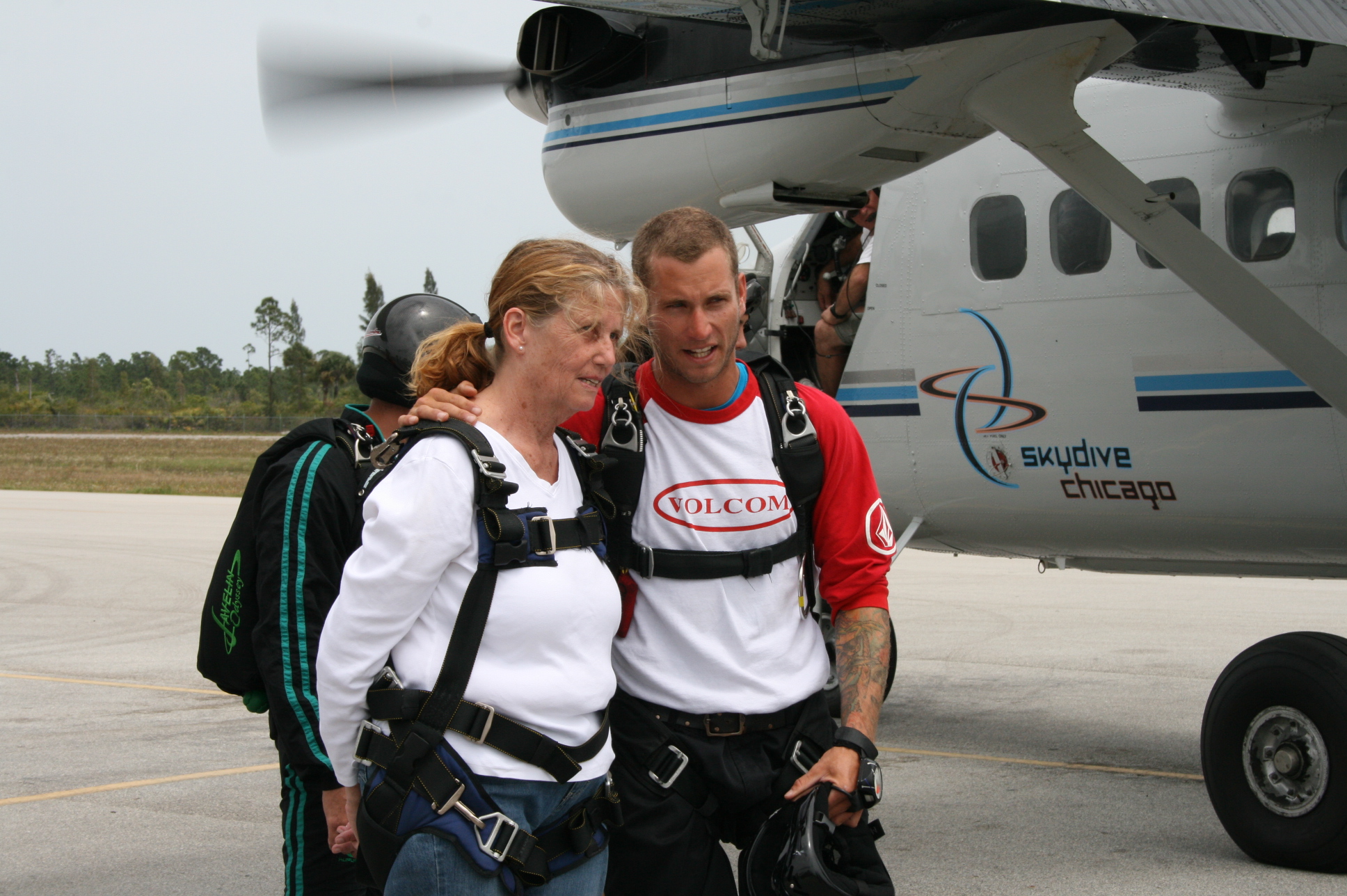
Tyler and his mom, on the ground, the day of the accident.
What the story with the skydiving accident?
On April 11, 2009, my mom planned her first ever skydive with me at my home dropzone, Skydive Sebastian. I had been in the sport for seven years at that point. She had a group of friends there that day all to watch, all nurses.
I made a few mistakes during my skydive. Having experienced a malfunction at a low altitude, I tried too long to correct my malfunction, thinking I could pull off a landing. I did not act fast enough and was not altitude aware throughout that last minute of being under my canopy.
By the time I realized I would not be capable of landing safely, I was too low to deploy my reserve parachute. I lost consciousness as I spiraled to the ground. My mom landed shortly after and was by my side until the helicopter flew me to the hospital. In those first hours, most people didn’t think I would survive my injuries.
What did the docs say?
After the five-day medically induced coma, I woke up on my 26th birthday, April 16. The first thing the doctor told me was that they managed to save my right leg. The compound femur fracture was so bad they almost had to amputate.
He said it was like a small bomb went off in my leg, losing four inches of femur bone. My left femur broke in half, my right upper and lower arm broke in half. I had a non-operative skull fracture, my mandible broke, along with both sides of my jaw, shattered, losing nine teeth.
I also had a concussion and lacerations to my face. This was landing in a grass field, three meters from the paved runway wearing a full-face helmet. Doctors did not have anything promising or hopeful to say over the following months, except that I was lucky to be alive.
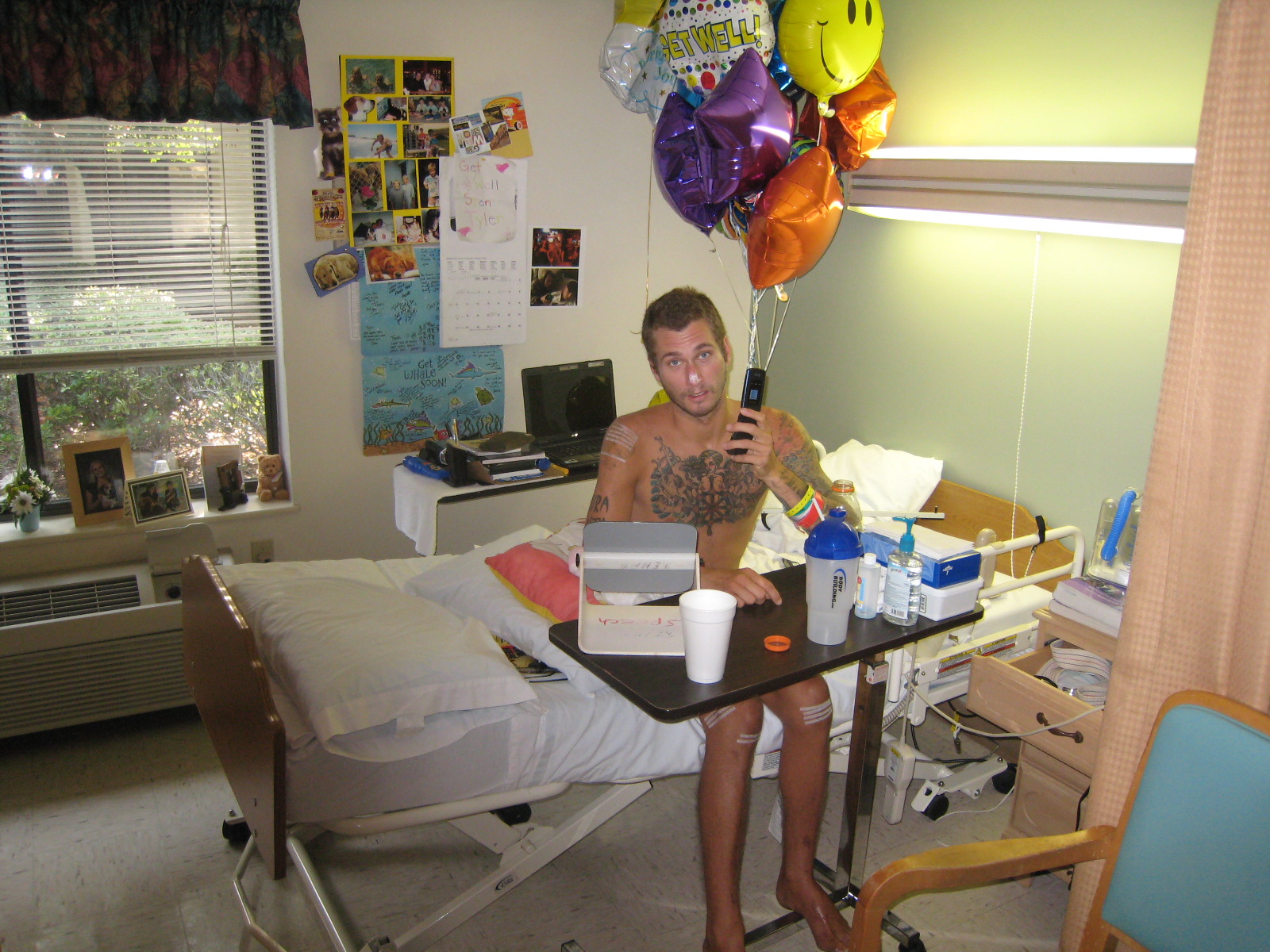
Post coma, post surgeries, in the recovery room.
How long did it take to walk, surf, and move again?
I spent roughly two weeks in the hospital before being moved to a rehab center. In the beginning I did not move unless it was for x-rays, and the pain was excruciating. At my worst, physically, I was confined to a wheelchair and had my mouth wired shut for two months in order for my jaw to heal.
Pins, screws and chains held my jaw in place, permanent metal rods from my hips to knees in both legs, and rods in my right arm. Beds and x-rays daily became normal for me.
My second rehab center was slightly more promising, although I was still only taking small steps. First time I stood up, with assistance, was on Mother’s Day, May of 2009.
Were you thinking about surfing through that time?
Surfing was always on my mind. I had a poster of Cory Lopez hanging up in my rehab room for inspiration. Although I didn’t want to see or be around the beach those first weeks out of rehab, thinking Cocoa Beach would be firing. Although in reality, it was dead summer – flat.
I never realized how much I loved surfing, until it was taken away from me.
What about the opioids? How did you pull through that?
I used them in the beginning responsibly, to push through pain and train daily, in order to get my life back. But as time went on, I found myself dependent on them. On monthly trips to South Florida, I was given the maximum dose. It was like a secret life, outside of my coworkers on the beach and my friends who were not involved with pain meds. But so many were.
To escape that life I took a chance, or a leap well out of my comfort zone. I cut ties with all the toxic people in my life and started training to be the best lifeguard I could be, drug free. I left my then full-time job as an Ocean Rescue Captain in 2012, and bought a one way ticket to Australia to try out for their lifeguard organization. I made the cut and continued traveling the world as a lifeguard and surf coach, never looking back.
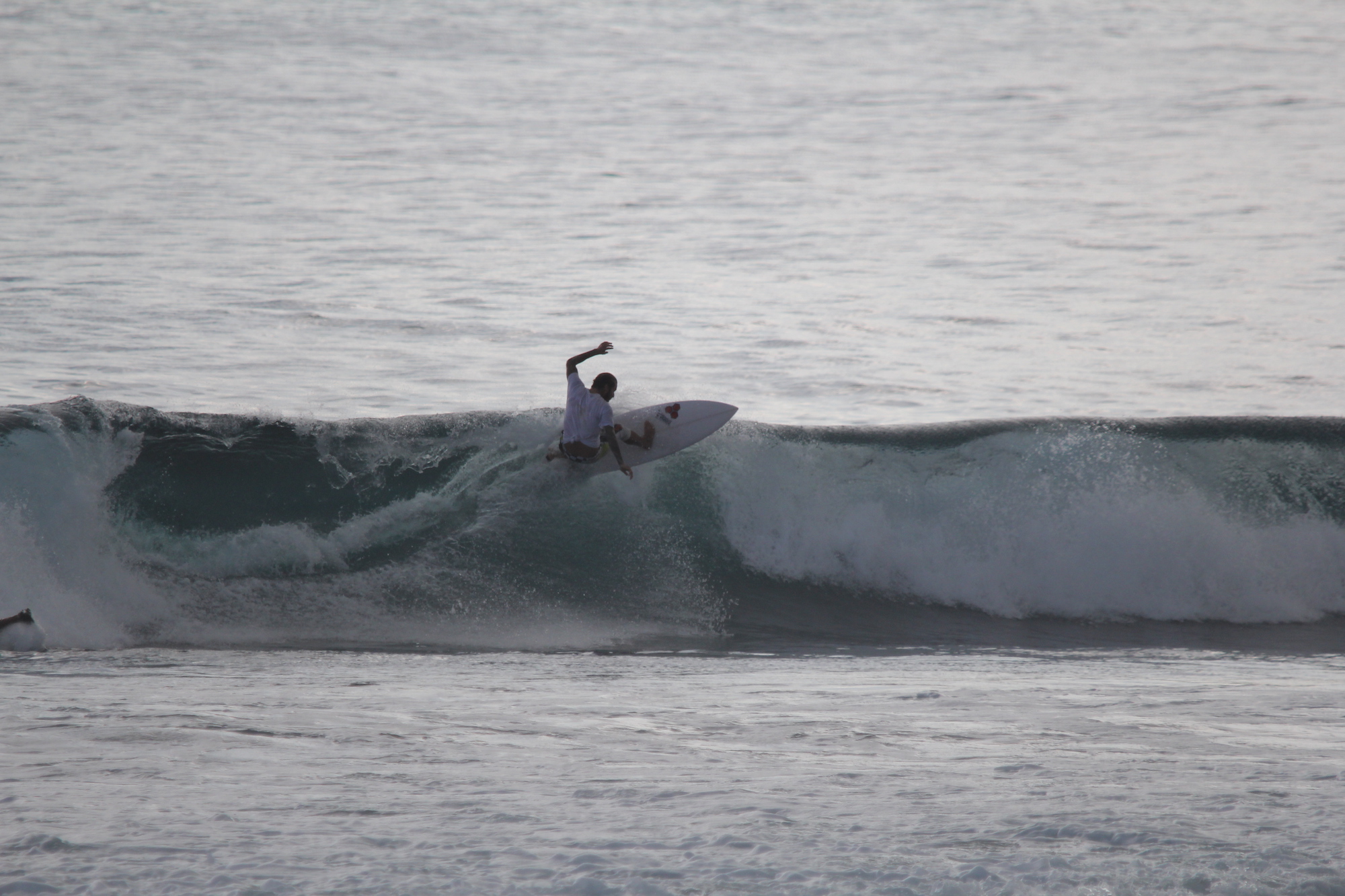
Back on a board after his road to recovery.
You’ve got a new job on the horizon…what’s the story with that?
I was working as a surf instructor at Surf Camp Lombok in November of last year. Best people, great job, although I felt I needed another challenge, something different, and less taxing on my body. I randomly received a message through LinkedIn with a job offer as a boathouse manager on the Island of Sumba, a resort called Nihi. Most surfers would know of Occy’s Left.
December was all conversations with my employer, interviews with Nihi, and a lot of contemplating. But ultimately, I accepted the job. Although due to a foot injury, and COVID, I’m still waiting to officially start my new job. Until then, I surf daily and walk with my dog here in Bali.
What do you hope people take away from your book?
Throughout my book, you’ll read about love, travel, addiction, surfing, and many lessons along the way. Also if you’re a kid out there without a college degree, realize there is hope for a future. I’m just a surfer from Cocoa Beach Florida who found himself a manager at a world class resort in Indonesia.
My advice: make a list, follow it, follow your progress and go one day at a time. Also, surround yourself with great people; your behavior will follow. And oftentimes you will be alone, but that’s also common when you’re on the right path, as many people stick to the herd, and don’t stray down the difficult path which leads to success.
This interview originally appeared on magicseaweed.

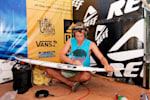

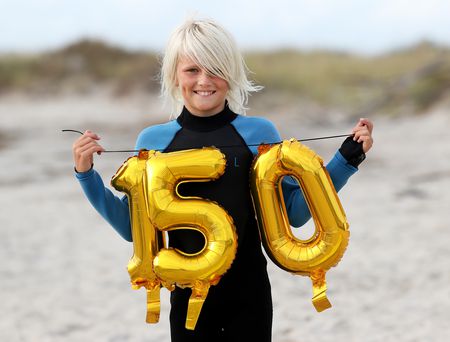

Recent Comments